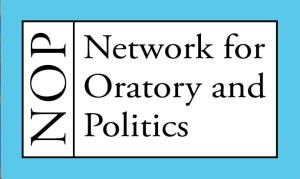The Network for Oratory and Politics presented the second speaker in its seminar series on ‘Audiences of Political Oratory’ on 22 January. Mr Drew Smith, Member of the Scottish Parliament for Labour and for Glasgow, came to the University of Glasgow to discuss how parliamentary politicians learn, use and think about political oratory – within and outside the chamber.

What do you think a parliamentary politician does? When Drew Smith asks schoolchildren this question at local school visits, they rarely suggest that a politician delivers speeches. Indeed, as Drew Smith went on to explain, only seldom do members of the public think speechmaking an important part of a politician’s job. This is partly to do with the type of political information channelled through the media but also, in the Scottish Parliament, with the structure imposed on parliamentary debate. Holyrood usually sits three days a week and only two-and-a-half hours each day is devoted to debate in the chamber. Strict time limits ensure voting time is kept but this also restricts individual speeches to six and sometimes just three minutes. There is minimal room for expansive development of an argument and an elaborate style to match it. Moreover, political journalists rarely report on the proceedings, satisfying themselves with the cleared press releases from party offices rather than experiencing the debate for themselves.

Yet, good oratorical skills are still important in the chamber, Drew Smith explained, but the characteristics of a good speaker are different from the 18th century House of Commons, which NOP speaker Chris Reid discussed on 27 January 2016. In the Scottish Parliament, a good debater must be able to give the nub of the argument in a few sentences, be able to foresee the debate and be prepared to deliver quick one-liners in altercation. To a Roman historian, this sounds very much like some of the debates in the Roman republican senate, where quick altercation could change minds and would separate credible politicians from untrustworthy charlatans.
Nobody is a good speaker from the start, and Drew Smith talked about the rhetorical training – or lack of the same – for modern politicians. He certainly did not receive any formal training but learnt from listening to other politicians and from practicing. Almost like a Roman republican politician-to-be, roaming the Forum Romanum with his mentor and listening to speeches and his mentor’s advice, picking up the tricks of the trade. Now, Drew Smith often go to hustings with junior colleagues and less experienced speakers, and he explained how they often needed to find their own voice through practice. Only in this way can they speak with authenticity and communicate sincerity. This observation underlines the important fact that speaking in public is a skill which can be studied but must be rehearsed and polished through practice in order to become natural.
Authenticity is the keyword for political credibility, not just at the moment but in other historical periods too where trust in a politician could be exchanged into votes and political influence. Drew Smith highlighted that a politician can never turn off being a politician as he or she is always on show and what is said can be taken in a much less forgiving context. Today, this is not only true at both public and private moments (remember Gordon Brown’s quip at the ‘bigoted woman’ whilst thinking the microphone was turned off) but also in different media. Being of the social media generation, Drew Smith has made his twitter and facebook accounts into extended versions of himself, and he uses them to communicate with his constituents and anybody interested in his views. Although social media do not offer the parameters for traditional public speaking, some of the same rules about authenticity, good language and quick thinking applies.
The Scottish Parliament is still young, Drew Smith emphasised, and it still has to develop traditions, also around speaking. The founders of the parliament wanted to decrease public distrust in parliamentarians by making parliamentary business and debate less about showing off and more about having a consensual debate and offering accessibility to the political decision-making process: the horseshoe shape instead of two sides opposing, the regulated meeting and speaking times to make debates run smoothly and allow MSPs a life outside Holyrood, and MSPs addressed by their name rather than their constituency. However, in Drew Smith’s view this has not succeeded entirely because the use of names have made debates more personal and we still experience a public distrust with politicians. He had suggestions for what politicians can do to mitigate this distrust but when asked whether the members of the public need to do more to engage with politics in order to better understand politicians and the issues they work with, Drew Smith argued that the responsibility lies with all citizens – not voters against politicians – to understand the political issues at hand. And with that encouragement to engage in politics and public debate, the evening ended.
An audio recording of Drew Smith’s talk and answers in the questions afterwards is available here.



